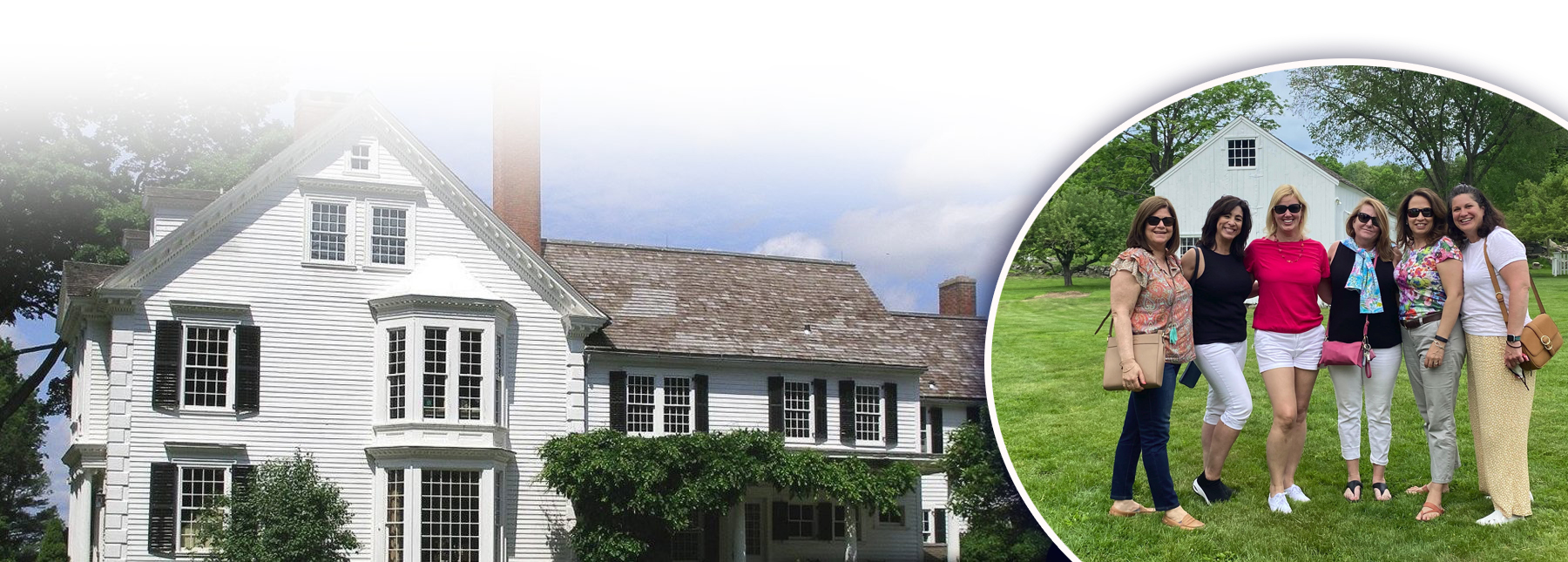Bellamy-Ferriday House & Garden
9 Main Street North, Bethlehem, CT 06751
(203) 266-7596
Summer Weather Advisory
Our historic property is not climate controlled. Staff may adjust the route, duration, and schedule of tours due to higher temperatures or extreme weather. Please contact us before your visit to confirm operations. Learn more »
Bellamy-Ferriday House & Garden
9 Main Street North, Bethlehem, CT 06751
(203) 266-7596
Summer Weather Advisory
Our historic property is not climate controlled. Staff may adjust the route, duration, and schedule of tours due to higher temperatures or extreme weather. Please contact us before your visit to confirm operations. Learn more »
Admission
$15/Adult
$12/Senior, Student, or Teacher
$5/Child 6-18
$7/Self-Guided Grounds Ticket
Free for Connecticut Landmarks Members & Children under 6
House Tour
Explore the life of Caroline Ferriday, a 20th-century philanthropist who championed human rights and social justice causes around the globe and in Connecticut, where she worked with survivors of Ravensbrück concentration camp. A visit to the five-acre site includes the grounds, a formal parterre garden, and the 18th-century residence built by Reverend Joseph Bellamy. Visitors will discuss the ways that beliefs and values can guide one’s actions by interpreting the lives, actions, and commitments of the house’s former residents.

LEARN MORE
The Bellamy-Ferriday House & Garden started its life as the Bellamy Manse, built by Reverend Joseph Bellamy. A preacher of great renown, Bellamy traveled throughout New England preaching the message of the First Great Awakening. His writings were published in New York, Boston, and Scotland. He built the house in two stages, beginning in 1754 and finishing in 1767 as his family, theological seminary, and stature grew. The property increased to 100 acres and was owned by his family for a century.
In 1912, New Yorkers Henry and Eliza Ferriday purchased the property as a summer residence for themselves and their only child Caroline. Beginning when she was 9 years old, Caroline Ferriday spent 78 summers on the property. The Ferriday family updated the house with modern amenities such as heat, electricity, and plumbing. Eliza and Caroline designed a formal parterre garden which features historic roses, peonies, lilacs, and numerous fragrant trees and shrubs. Interested in the life of Bellamy, Caroline researched and collected antiques related to Reverend Bellamy’s life, many of which are still on display in the house.
Caroline Ferriday supported many social justice and human rights causes. In particular, she supported the Free France Movement during World War II and secured medical assistance for survivors of Ravensbrück concentration camp. These survivors, many of which were horribly disfigured, were able to start their lives again thanks to the philanthropy of Caroline Ferriday. She received the Cross of Lorraine and the French Legion of Honor medal for her efforts.
A fictionalized account of Caroline’s life, focusing on her work with the women of Ravensbrück, is chronicled in the New York Times best-selling book Lilac Girls by Martha Hall Kelly. Kelly also wrote two more historic-fiction novels, Lost Roses and Sunflower Sisters which tell stories of Eliza Ferriday and the Woolsey Sisters, respectively.
LEARN MORE
The Bellamy-Ferriday House & Garden started its life as the Bellamy Manse, built by Reverend Joseph Bellamy. A preacher of great renown, Bellamy traveled throughout New England preaching the message of the First Great Awakening. His writings were published in New York, Boston, and Scotland. He built the house in two stages, beginning in 1754 and finishing in 1767 as his family, theological seminary, and stature grew. The property increased to 100 acres and was owned by his family for a century.
In 1912, New Yorkers Henry and Eliza Ferriday purchased the property as a summer residence for themselves and their only child Caroline. Beginning when she was 9 years old, Caroline Ferriday spent 78 summers on the property. The Ferriday family updated the house with modern amenities such as heat, electricity, and plumbing. Eliza and Caroline designed a formal parterre garden which features historic roses, peonies, lilacs, and numerous fragrant trees and shrubs. Interested in the life of Bellamy, Caroline researched and collected antiques related to Reverend Bellamy’s life, many of which are still on display in the house.
Caroline Ferriday supported many social justice and human rights causes. In particular, she supported the Free France Movement during World War II and secured medical assistance for survivors of Ravensbrück concentration camp. These survivors, many of which were horribly disfigured, were able to start their lives again thanks to the philanthropy of Caroline Ferriday. She received the Cross of Lorraine and the French Legion of Honor medal for her efforts.
A fictionalized account of Caroline’s life, focusing on her work with the women of Ravensbrück, is chronicled in the New York Times best selling book Lilac Girls by Martha Hall Kelly. Kelly also wrote two more historic-fiction novels, Lost Roses and Sunflower Sisters which tell stories of Eliza Ferriday and the Woolsey Sisters, respectively.

